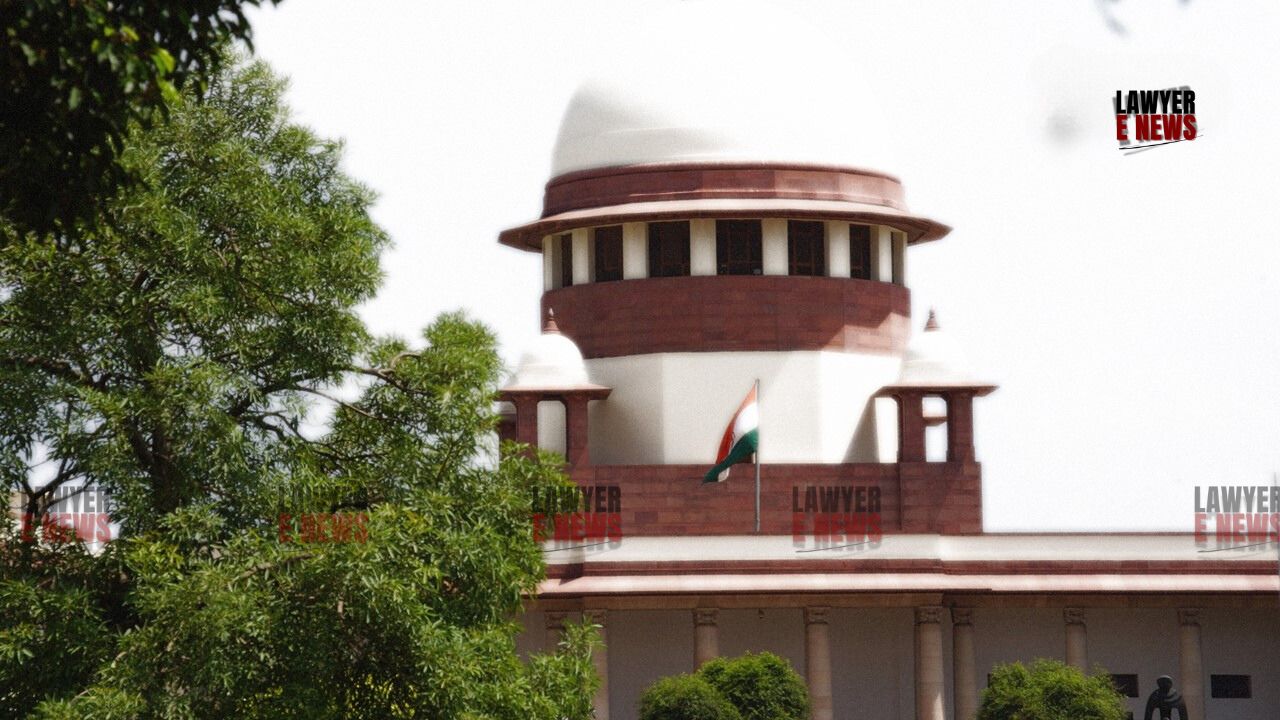-
by Admin
15 February 2026 5:01 PM



Supreme Court Reverses Conviction in Case of Property Dispute and Alleged Murder. Supreme Court acquitted three individuals convicted of murder under Section 302 of the Indian Penal Code (IPC). A bench comprising Justice Dipankar Datta and Justice Sandeep Mehta overturned the life sentences handed down by the trial court and upheld by the High Court of Jharkhand, finding that the prosecution had failed to establish a complete chain of incriminating circumstances in a case based on circumstantial evidence.
The appellants, Nusrat Parween and Ahmad Khan, were accused of murdering Hamida Parween, allegedly to usurp her share of family property. The third co-accused, Abdul Rahman Khan, though not an appellant before the Supreme Court, was also acquitted under Article 142 of the Constitution. The Court held that the prosecution's case, based on motive and the "last seen together" theory, was riddled with inconsistencies and gaps, warranting the reversal of the convictions.
The case arose from the murder of Hamida Parween, who was found dead on March 11, 1997, inside her residence at Holding No. 13 in Dhatkidih, Jamshedpur. The prosecution alleged that Hamida's in-laws—her husband’s brothers Ahmad Khan and Abdul Rahman Khan, and her sister-in-law Nusrat Parween—conspired to kill her due to disputes over the property.
Hamida, who lived with her three children, had reportedly lodged a complaint against the accused under Section 107 read with Section 116(3) of the CrPC over repeated quarrels about property. On the day of the incident, her sons returned from school to find the house locked from outside. Later, Hamida’s body was discovered inside the house, showing signs of strangulation.
The trial court convicted the accused based on circumstantial evidence, including motive and the theory of "last seen together," and sentenced them to life imprisonment under Section 302 IPC. The High Court upheld the conviction on appeal.
Was the motive sufficiently proved to establish a reason for the accused to commit the crime?
Did the prosecution prove the "last seen together" theory and fulfill the requirements under Section 106 of the Indian Evidence Act?
Was the conviction sustainable based on circumstantial evidence?
The Court examined the prosecution's claim that the murder was motivated by property disputes. While family members of the deceased, including her brother Md. Firoj (PW4), alleged ongoing quarrels between the deceased and the accused, the Court found the evidence unconvincing. It noted that quarrels among family members are not uncommon and do not automatically imply motive for murder.
Moreover, a complaint filed by Hamida under Section 107/116(3) CrPC against the accused, which could have corroborated the motive, was never produced in evidence. This lack of direct evidence weakened the prosecution's theory of motive.
The Court observed: “Mere familial disputes do not substantiate motive for murder. Immediate cause or provocation was not established, nor was there unimpeachable evidence to prove that the accused had any intent to usurp the deceased's property."
The prosecution relied on the "last seen together" theory, asserting that the accused were present with the deceased at the house before her death. The Court emphasized that for the prosecution to shift the burden of proof under Section 106 of the Evidence Act, it must first establish foundational facts proving that the accused were indeed "last seen" with the deceased.
The Supreme Court noted several deficiencies:
The deceased’s son, Md. Sahid Khan (PW3), did not testify that the accused were present in the house when he left for school.
None of the neighbors, including PW1 Chand Mohammad, PW2 Matiur Rahman, and others, testified to seeing the accused flee the house after the alleged incident.
The alleged quarrel between the deceased and the accused on the morning of the incident was not corroborated by any witnesses.
The Court stated:
"The prosecution failed to prove the presence, let alone exclusive presence, of the accused with the deceased in the house at the time of the incident. Thus, shifting the burden of proof under Section 106 was improper."
Reiterating the principles laid down in Sharad Birdhichand Sarda v. State of Maharashtra (1984), the Court held that circumstantial evidence must form a complete chain, leaving no room for doubt about the accused’s guilt. In this case, the prosecution's narrative was marred by inconsistencies, including:
No credible evidence of the accused’s involvement in the murder.
Lack of explanation for why key witnesses, such as the deceased's other son and daughter, were not examined.
Contradictions between witness statements and police records, including the timeline of events and the filing of the missing persons' report.
The Court found the prosecution’s evidence speculative and insufficient to meet the standard of "beyond reasonable doubt."
Citing the flawed prosecution case, the Court acquitted the appellants Nusrat Parween and Ahmad Khan, granting them the benefit of doubt. Using its powers under Article 142 of the Constitution, the Court also extended the acquittal to Abdul Rahman Khan, the non-appealing co-accused, noting that his case was identical to that of the appellants.
The Court concluded: "The prosecution has failed to establish the chain of incriminating circumstances against the accused beyond the shadow of a doubt. The benefit of doubt must therefore be extended to the accused."
The Supreme Court allowed the appeals, set aside the convictions, and acquitted the accused. The bail bonds of Nusrat Parween and Ahmad Khan were discharged, and Abdul Rahman Khan was ordered to be released from custody if no other cases were pending against him. The Court also disposed of all pending applications in the matter.
Key Takeaways
Burden Under Section 106: The burden of proving facts "within the special knowledge" of the accused can only shift once the prosecution establishes foundational facts.
Motive in Circumstantial Evidence Cases: Proof of motive is not mandatory but assumes importance in cases relying solely on circumstantial evidence.
Judicial Scrutiny: The Supreme Court reaffirmed the necessity for courts to meticulously scrutinize circumstantial evidence to ensure that convictions are based on unimpeachable proof.
Date of Judgment: December 10, 2024
